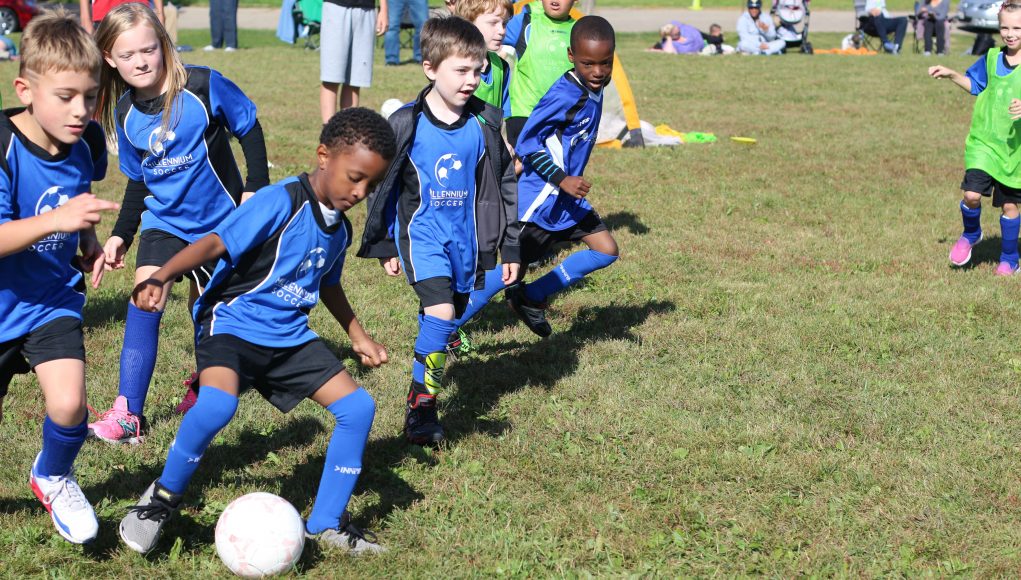Erica Colby just wanted a place for her daughter to play soccer like all the other kids. Most of us had similar experiences while growing up. For most of us, youth soccer went hand in hand with things like ice cream socials and elementary school. The coach was usually the parent of a friend. Everyone carpooled. It was a way of life, especially for the kids under 10 or so.
It still is a way of life. But it’s a very expensive, time-consuming, financially risky way of life these days.
For Erica and her daughter, the Millennium Soccer Club was the only answer. As Erica looked around for places her daughter could play she found that working families like hers were frozen out financially from having their kids participate in something that used to be taken for granted as part of childhood.

In the old days it was things like tennis or golf that we looked at as being country club sports. Those were for the well-to-do and wealthier families. Most families, particularly families of color or working-class families, couldn’t afford memberships at the country clubs where those sports took place.
Soccer is a worldwide sport because everyone can play it everywhere for basically no cost. It’s fun for the kids, builds teamwork and social skills and people can literally do it anywhere. But around Dane County, that’s no longer the case. Soccer clubs are becoming increasingly more exclusive.
Entities like the Millennium Soccer Club have become more vital than ever as a result, especially on Madison’s south side.
“My daughter has been in all three seasons; fall, summer and winter,” said Erica Colby. “She enjoys the whole atmosphere. She’s able to learn from high school kids who volunteer to teach the children. It’s been great. She’s always excited to go back. She never wants to miss.”

Price was the key factor in Erica’s decision to have her daughter play through Millennium.
“The biggest reason we were able to put her in is it’s so affordable,” she says. “I can pay a flat fee and this one fee carries through from fall to spring. I had been looking into getting her into soccer previously but the times and the fees didn’t work well with us. It’s been a huge blessing for us to have her in an extracurricular activity.”
The Millennium Soccer Club is the only soccer organization in the Madison area that specifically organizes programs for kids living in lower-income, diverse neighborhoods, says Millennium organizer Tom Grogg.
Kids participate in weekly sessions that consist of a practice and a game. The typical Millennium team has about 6-8 players and plays 4 on 4 games with no goalies. They don’t keep track of wins or losses but focus primarily on the development of specific skills.
In order to facilitate skills teaching, Millennium employs high schoolers who play for their high school teams to come out each week and teach the younger kids the fundamentals of the game. All of Millennium’s practices and games are held at the same sites every week on the same day each week in order to make it easier for families to both plan and attend the sessions.
Huegel, Leopold and Lincoln are the main school sites at which Millennium organizes and holds those sessions.

Millennium charges $15 for the school year and $10 for summer camps. That’s a far cry from, say, the $45-85 charge for a single child from age 6-10 to join winter soccer at Keva in Middleton or the more than $1,000 per season it costs to join Madison’s elite clubs.
“We’re working on a lot of the same skills traditional clubs do but our goal is to help kids play who might not have been able to play,” says Tom Grogg, who has been a lead organizer of Millennium. “This Fall, we have 250 first through fifth graders playing. That’s from a host of different neighborhoods and places. We draw kids mostly from the neighborhoods especially around Lincoln and other lower-income neighborhoods.”
Grogg says they spend a considerable amount of time focusing on basics like dribbling and passing.
“We’re trying to build a community through soccer,” he said. “We make an effort to make sure the teams are diverse in terms of ethnicity, gender and grade level. About 75% of the kids are kids of color and we have quite a few girls playing this Fall. We’re mostly serving kids from low-income families.”
Grogg said that the high schoolers who volunteer as coaches are an integral part of the organization as well, and many have continued to volunteer even after starting college.
“We depend a lot on high school players to serve as volunteers and coaches for us,” Grogg says. “They’re available on Saturday mornings to coach our kids. We also get some from Madison College and Wisconsin. They’ve been the heart of enabling us to pull this together. Any given year there’s about 100 who sign up at some time to help coach.”
The heart of Millennium is teaching kids how to have fun. At a time where many youth sports across the nation have lost the focus on fun with ever increasing financial goals and putting the best kids together to form more winning and, well, lucrative teams, it seems that a little fun is perfectly called for.




























